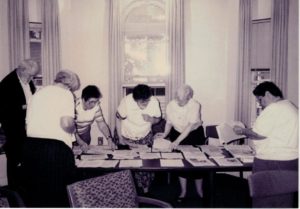
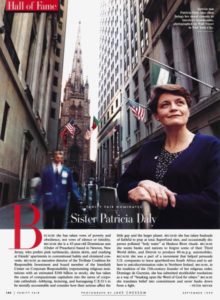




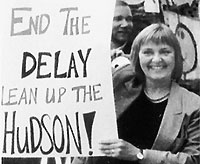

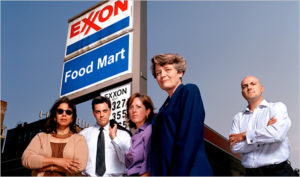
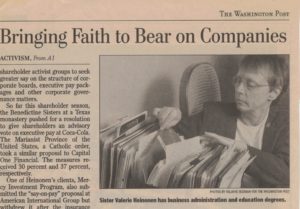
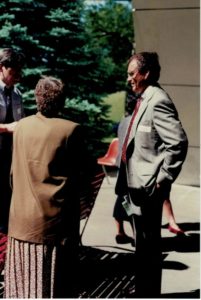

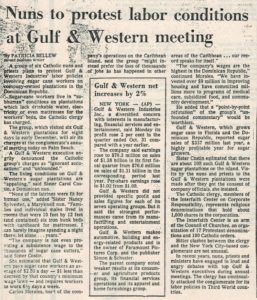

History
Investor Advocates for Social Justice (IASJ), formerly the Tri-State Coalition for Responsible Investment (Tri-CRI), was founded in 1975 by Catholic congregations involved in the movement to encourage corporations to leave apartheid South Africa. The work represented below was done under the name Tri-CRI until our organizational transition to Investor Advocates for Social Justice until Fall 2019.
Faith-based institutions have a proud history and legacy as leaders of activating their investments to promote social good, looking at where their money is invested, and engaging with companies around the impacts of their business. In the United States, many churches, synagogues, and Congregations of Women and Men Religious autonomously manage their own financial resources like pension funds, retirement funds, and endowment funds. Historically, these faith-based institutions have instructed financial managers to screen out companies participating in unjust behavior that were at odds with their values and ministry. However, by 1970, growing concerns about human rights, women and people of color in the workplace, the environment, and unjust corporate behavior led religious institutions to think about more active strategies beyond screens to use the leverage that their financial resources and share-holdings in companies provided.
Apartheid South Africa Investor Movement
American business activities with the government of apartheid South Africa was a pinnacle concern during the 1960’s and onward that rallied faith-based investors to work together. They realized that rather than divesting, collectively engaging corporate management regarding their concerns could help change company behavior. In 1971 the Interfaith Center on Corporate Responsibility (ICCR) was founded to bring together the work of faith-based investors and religious leaders using their investments to end apartheid and promote corporate social responsibility.
At the time, General Motors was a large employer and investor in South Africa, and many religious institutions that held stock in the company grew concerned about its involvement. In 1970, the Episcopal Church filed a shareholder resolution with the company to request that it withdraw its business from South Africa until apartheid was abolished. The engagement around apartheid South Africa continued on for 20 years with companies like American Express, Union Carbide, Corning, IBM, Merck, Pfizer, Chevron, Bristol-Myers, Eli Lilly, and Newmont Mining. This extensive effort was one of many factors and movements that contributed to ending Apartheid.
Regional CRI
In 1975, IASJ was founded as the Tri-State (Connecticut, New Jersey, New York) Coalition for Responsible Investment as one of the first and the largest Catholic Coalitions for Responsible Investment (CRI) organizations. Under the leadership and organizing of Father Michael Crosby, OSF, with support from Catholic leadership structures, CRIs were established in different regions across the country to facilitate the work of Catholic institutions in partnership with the larger interfaith community of ICCR. Through the years IASJ members met, developed strategies for addressing corporate impacts that affected our region, and organized around shared issues of concern.
A New Moment: Investor Advocates for Social Justice
Recognizing the important legacy and power of this work and the need to evolve to meet the changing needs of our community, in 2019, the Tri-State Coalition for Responsible Investment evolved away from the CRI structure and to Investor Advocates for Social Justice. The organization’s members called for a move towards an interfaith mandate and a broader regional reach, and to reaffirm our mission to advocate on behalf of investors with faith-based values to promote human rights, climate justice, racial equity, and the common good on behalf of our Affiliate investors.
 History of Women’s Leadership
History of Women’s Leadership
Our founders, past directors, and many Affiliates take part in a rich history of women religious breaking boundaries and leading social justice advocacy across the globe. After its founding, IASJ (formerly Tri-CRI) was led by Catholic sisters Regina Murphy, SC, and John Marion Davidson, OP. IASJ (formerly Tri-CRI) went on to be led by Sister Pat Wolf, RSM, Sister Barbara Glendon, OSU, Sister Patricia Daly, OP, Mary Beth Gallagher, and now Ruthly Cadestin, who serves as our current Executive Director.
The United States welcomed a large influx of women joining religious life and they have been committed social justice advocates. For many, joining religious life provided an avenue to access higher education, meaningful careers, and to radically align one’s lifestyle to their values. Catholic sisters have historically worked for low to no wages as teachers, nurses, childcare providers, charity coordinators, and activists giving themselves to a life of service to society. They have participated in and led movements to promote peace and to end discrimination across the globe.
Sisters among our Affiliates and interfaith networks pioneered the field of shareholder activism on corporate accountability, and continue to lead the work today. Over the decades, they have used their institutions’ investments to courageously take on powerful industries like weapons manufacturers, pharmaceuticals, fossil fuel companies, agriculture commodities, and big banks over serious human rights abuses. Starting with the movement to divest American businesses from apartheid South Africa, religious women at IASJ have moved companies on many important legacy issues:,
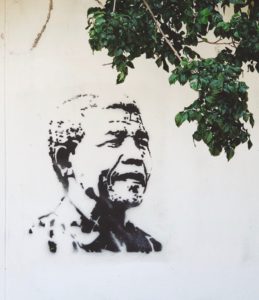 Many US corporations conducted business in South Africa under apartheid rule, despite the Anti-Apartheid Act enacted in the US in 1986 imposing sanctions against the country. IASJ and other interfaith investors at ICCR engaged banks, oil and gas producers, technology companies, and other consumer goods businesses like Colgate and Coca Cola. IASJ Affiliate congregations filed repeated shareholder resolutions at these companies, asking the management to halt operations in South Africa until apartheid was abolished. The engagement around apartheid South Africa continued on for 20 years with companies like American Express, Union Carbide, Corning, IBM, Merck, Pfizer, Chevron, Bristol-Myers, Eli Lilly, and Newmont Mining. This extensive effort was one of many factors and movements that contributed to ending Apartheid.
Many US corporations conducted business in South Africa under apartheid rule, despite the Anti-Apartheid Act enacted in the US in 1986 imposing sanctions against the country. IASJ and other interfaith investors at ICCR engaged banks, oil and gas producers, technology companies, and other consumer goods businesses like Colgate and Coca Cola. IASJ Affiliate congregations filed repeated shareholder resolutions at these companies, asking the management to halt operations in South Africa until apartheid was abolished. The engagement around apartheid South Africa continued on for 20 years with companies like American Express, Union Carbide, Corning, IBM, Merck, Pfizer, Chevron, Bristol-Myers, Eli Lilly, and Newmont Mining. This extensive effort was one of many factors and movements that contributed to ending Apartheid.
 In the 1980’s, companies such as Bristol-Myers Squibb, Gerber, Nestle, and American Home Products were marketing baby formula to mothers living below the poverty line across the globe. Corporate advertising that pitched formulas as preferential to breastfeeding contributed to infant mortality or disease in areas with unsafe water quality, or contributed to malnutrition where mothers could not afford to buy sufficient quantities. IASJ affiliates engaged management and filed shareholder resolutions with these companies, asking that they reconsider marketing tactics that put the most vulnerable communities at risk, especially where mothers cannot use formula safely. In 1984, investor advocates won significant reforms in the marketing of infant formula through an organized boycott of Nestle.
In the 1980’s, companies such as Bristol-Myers Squibb, Gerber, Nestle, and American Home Products were marketing baby formula to mothers living below the poverty line across the globe. Corporate advertising that pitched formulas as preferential to breastfeeding contributed to infant mortality or disease in areas with unsafe water quality, or contributed to malnutrition where mothers could not afford to buy sufficient quantities. IASJ affiliates engaged management and filed shareholder resolutions with these companies, asking that they reconsider marketing tactics that put the most vulnerable communities at risk, especially where mothers cannot use formula safely. In 1984, investor advocates won significant reforms in the marketing of infant formula through an organized boycott of Nestle.
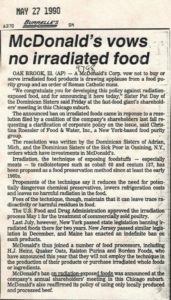 Food irradiation is a process of using gamma rays or electrons to sterilize and preserve food. In the 1980’s through the 1990’s, it was unclear whether or not major food brands were using and selling irradiated products, which had not been sufficiently tested at the time. IASJ Affiliates filed shareholder resolutions along with other ICCR members asking companies to clarify their policies on irradiated foods. In response, companies like McDonalds and McCormick made public statements that they would ban irradiated food products.
Food irradiation is a process of using gamma rays or electrons to sterilize and preserve food. In the 1980’s through the 1990’s, it was unclear whether or not major food brands were using and selling irradiated products, which had not been sufficiently tested at the time. IASJ Affiliates filed shareholder resolutions along with other ICCR members asking companies to clarify their policies on irradiated foods. In response, companies like McDonalds and McCormick made public statements that they would ban irradiated food products.
IASJ Affiliates have historically engaged with companies on racial discrimination and racist advertising. In 1985, the toothpaste brand Colgate-Palmolive came under fire for acquiring a brand that used a derogatory racial term and caricature to sell toothpaste in China. IASJ affiliates and other interfaith investors engaged with the company, encouraging them to eliminate the use racist epithets and images in advertising. Colgate eventually changed the name and imagery of the product in 1989.
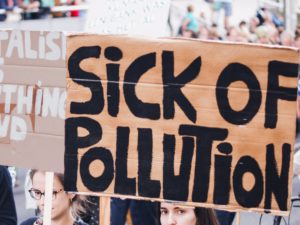 Former IASJ Director Pat Daly was a pioneer in urging companies to clean up pollution and take accountability for their environmental impacts. In the 1980’s and 90’s, IASJ affiliates filed resolutions with Amoco, Bristol-Myers Squibb, Chevron, Dow, DuPont, GTE, and McDonald’s on their environmental track records. In response to radiation contamination in Texas, IASJ filed a resolution with Chevron requesting that the company to clean up uranium mine tailings that had contaminated soil and water. In the 1990’s, IASJ was a major player in encouraging General Electric to take responsibility for 1.3 billion pounds of PCB contamination in the Hudson River. Sr. Pat also led IASJ to champion climate change asks with large corporate emitters in the United States, a legacy which inspires our climate & environmental justice work today.
Former IASJ Director Pat Daly was a pioneer in urging companies to clean up pollution and take accountability for their environmental impacts. In the 1980’s and 90’s, IASJ affiliates filed resolutions with Amoco, Bristol-Myers Squibb, Chevron, Dow, DuPont, GTE, and McDonald’s on their environmental track records. In response to radiation contamination in Texas, IASJ filed a resolution with Chevron requesting that the company to clean up uranium mine tailings that had contaminated soil and water. In the 1990’s, IASJ was a major player in encouraging General Electric to take responsibility for 1.3 billion pounds of PCB contamination in the Hudson River. Sr. Pat also led IASJ to champion climate change asks with large corporate emitters in the United States, a legacy which inspires our climate & environmental justice work today.
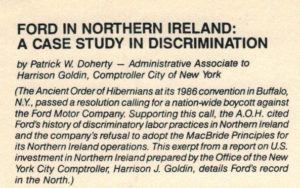 Throughout the 1970’s and 80’s, religious investors expressed growing concern about human rights abuses and discrimination against Catholics in Northern Ireland. IASJ filed resolutions with Dun & Bradstreet, IBM, Minnesota Mining and Manufacturing, Teleflex, and VF on issues of discrimination and workers’ rights in Northern Ireland.
Throughout the 1970’s and 80’s, religious investors expressed growing concern about human rights abuses and discrimination against Catholics in Northern Ireland. IASJ filed resolutions with Dun & Bradstreet, IBM, Minnesota Mining and Manufacturing, Teleflex, and VF on issues of discrimination and workers’ rights in Northern Ireland.

IASJ has a legacy of supporting workers and strong labor policies. In 1971, IASJ filled a resolution with General Motors on their labor conditions in Chile after it announced it would close its assembly plant there, laying off 500 workers. In 1981, IASJ affiliates and ICCR members visited six different sugar cane plantations in the Dominican Republic owned by the company Gulf & Western. They brought their concerns about hazardous working conditions and low wages to the company’s annual meeting to encourage stronger labor rights. IASJ affiliates have developed decades of expertise in engaging companies on labor conditions in their supply chains, aligning with our current campaign focusing on the automotive industry.
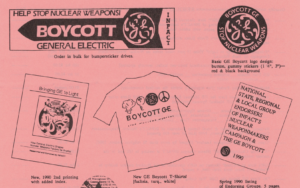 Catholic sisters have a long history of promoting peace and opposing the use of dangerous weapons like nuclear bombs. From its early years onwards, IASJ affiliates participated in a successful boycott campaign against General Electric, which was producing parts for nuclear weapons at the time. In 1992 in response to investor and consumer pressure, GE announced that it would eliminate its aerospace division, ending its leadership at the time in the nuclear weapons business.
Catholic sisters have a long history of promoting peace and opposing the use of dangerous weapons like nuclear bombs. From its early years onwards, IASJ affiliates participated in a successful boycott campaign against General Electric, which was producing parts for nuclear weapons at the time. In 1992 in response to investor and consumer pressure, GE announced that it would eliminate its aerospace division, ending its leadership at the time in the nuclear weapons business.
IASJ Affiliates have long engaged the largest financial institutions on issues of justice connected to their business. This includes engaging around extending lines of credit to companies with egregious labor or human rights practices, expansion of banking services into insurance and other financial services, money laundering, discriminatory and predatory lending practices, Community Reinvestment Act performance, risk-taking behavior that contributed to the 2009 financial crisis, and excessive speculation in food commodities. For years, IASJ Affiliates and interfaith partners in ICCR have filed shareholder resolutions on ethics, culture, and business standards.
The commitment of Catholic sisters to end human trafficking has informed shareholder engagements with the hotel and airline industries, encouraging companies to sign on to the ECPAT code and to raise awareness about the risks of human trafficking. When the Super Bowl was hosted in New Jersey in 2014, our Affiliates organized outreach to hotels both locally and through shareholder engagement at the corporate level.


